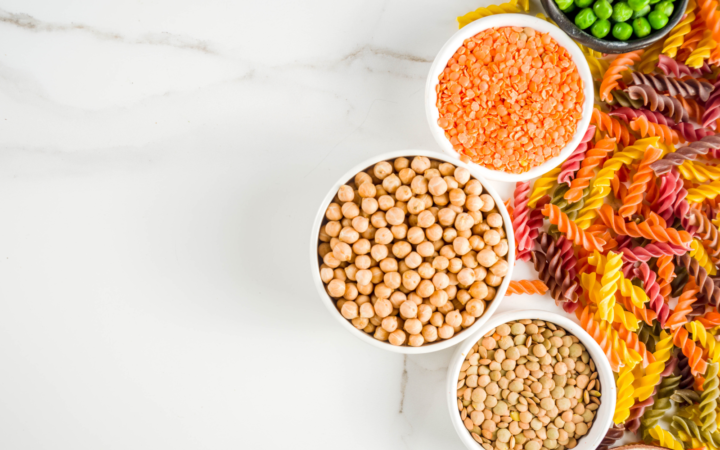FODMAP Elimination Diet: What It Is And How It Could Help You

At one point or another, we’ve all had some digestive issues, whether it was stomach discomfort, gas, bloating, diarrhea, or constipation.
But for many people, it’s not just a once in a while occurrence- it’s a chronic disorder. In fact, according to the International Foundation for Gastrointestinal Disorders, irritable bowel syndrome (IBS) affects between 25 and 45 million people in the United States and an estimated 10-15% of the world’s population. (1)
IBS symptoms include abdominal pain, bloating, gas, and problematic bowel activity such as chronic or recurrent diarrhea, constipation, or both. While the exact cause of IBS is unknown, it’s believed that symptoms result from a disturbance in how the gut, brain, and nervous system interact. (2)
Even though stress doesn’t cause IBS, the gut-brain connection suggests that stress can worsen or trigger symptoms.

IBS and FODMAPS
So what can you do if suspect you have IBS or related condition?
The first step is to talk to your doctor or a registered dietitian. Once you get a proper diagnosis, then you can begin treatment.
Many doctors recommend a low FODMAP diet for IBS patients, which has been clinically proven to offer a number of benefits. (3)
Read on for a breakdown of what you need to know about FODMAPs and how following a FODMAP elimination diet could reduce your IBS symptoms and improve your health.
What Is The FODMAP Elimination Diet?
A FODMAP elimination diet, or low FODMAP diet, is one that is low in fermentable carbs that cause gas, bloating, and gastrointestinal flare-ups.
Created by researchers at the Monash University in Melbourne, Australia, the low-FODMAP diet has been tested in thousands of IBS patients spanning multiple studies.
The great news is that this diet has been shown to improve digestive health for an overwhelming majority of patients. (4) What’s more, there’s ongoing research to determine if it can help with other digestive issues such as diverticulitis. (5)
It must be stated that following a low FODMAP diet is quite specific and far from a fad diet.
It requires a serious commitment and adherence to a meal plan suited to your needs. That said, this diet is not a lifetime solution.
It’s a temporary elimination diet (usually 2 to 8 weeks) that aims to reduce the amount of fermentable carbs and bacterial imbalance in the gut.

High FODMAP Foods
Below are some common high FODMAP foods that you should avoid while on the low FODMAP diet. Bear in mind this is not a complete list.
Check out the Monash University FODMAP Diet App for the world’s most comprehensive database of FODMAP food information.
Vegetables: Artichoke, asparagus, cauliflower, garlic, onions
Fruits: Apples, cherries, mango, stone fruit, watermelon
Dairy: Milk, yogurt, ice cream, other dairy products
Proteins: Most legumes and marinated meats, poultry, seafood
Breads & Grains: Breads made from wheat, rye or barley, breakfast cereal
Sweeteners: Agave, high fructose corn syrup, honey, artificial sweeteners
Nuts & Seeds: Cashews, pistachios

Low FODMAP Foods
Below are some common low FODMAP foods that are allowed on the FODMAP elimination diet.
For the full list of FODMAP foods, refer to the Monash University FODMAP Diet App.
Vegetables: Eggplant, green beans, bell pepper, carrot, cucumber, lettuce, potato, tomato, zucchini
Fruits: Blueberries, cantaloupe, grapes, kiwi, citrus, pineapple, strawberries
Dairy: Hard cheeses, lactose-free milk, almond milk
Proteins: Eggs, firm tofu, cooked plain meats, poultry, seafood, tempeh
Breads & Grains: Corn tortillas, gluten-free breads not made from wheat, rye, or barley
Sweeteners: Dark chocolate, maple syrup, rice malt syrup
Nuts & Seeds: Almonds, macadamias, peanuts, pumpkin seeds, walnuts

Phases Of A Low FODMAP Diet
Following a low FODMAP diet can be tricky. Before getting started, take a look at the three phases of the low FODMAP diet to help you better understand what it involves
Elimination Phase
This phase eliminates everything on the high FODMAP food list from your diet.
Again, this is a short-term part of the plan. After all, it’s not a good idea to eliminate entire food groups for the long-term as some gut bacteria (hello, probiotics!) are necessary for good health. (6)
While some people will experience a reduction in symptoms within the first couple of weeks, it can take others the full eight-week trial period.
Document your progress in a food diary, discuss it with your health care professional, and proceed to the next step when ready.
Reintroduction Phase
After going through the elimination stage, it’s time to slowly reintroduce some FODMAPs into your diet. It’s especially important to consult your doctor or registered dietitian to identify the types and portion sizes of FODMAPs your body tolerates.
Research shows that this approach is effective in the management of gut function. (7) FYI, you’ll need to keep following a low FODMAP diet during this phase – low FODMAP recipes are a good way to keep meals from getting boring.
Personalization Phase
The third and final stage of the low FODMAP diet is all about reviewing the information gathered in the reintroduction phase and customizing your diet based on what you learned.
Not everyone is going to have the same food intolerances, so it’s important that your doctor or dietician helps you come up with the most sustainable and least restrictive diet plan. This ensures you can still enjoy a wide variety of foods, which is linked to long-term quality of life and gut health, while still keeping IBS symptoms at bay. (8)

Feeling Fine, Finally!
It’s one thing to feel a little discomfort when you’ve eaten too much or had the “wrong thing” for lunch, but it’s an altogether different experience when you have chronic stomach pain and stool symptoms that happen on a weekly basis for months on end.
If that sounds like you, there’s a strong chance you could be suffering from irritable bowel syndrome.
But only a medical professional can accurately diagnose you and rule out other potential disorders.
The good news is that IBS can be treated. It’s an extremely common condition and while it can seriously impact your life emotionally, socially, and professionally, it is not fatal. (9)
It’s true that not everyone with IBS responds favorably to the FODMAP elimination diet, but there are other ways to get help.
Talk to your doctor and always listen to what your body is trying to tell you.

